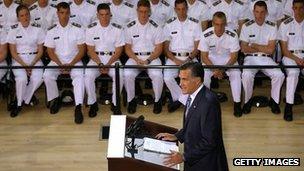Would Mitt Romney make the world a better place?
- Published
- comments

Mitt Romney doesn't like Barack Obama's foreign policy, but what would he actually change?
Mitt Romney has a stark warning for all of us: Another four years of Obama and the world will "grow darker".
But if he is elected, he will secure America's interests, further its values and prevent conflict. He'll do so, moreover, "wisely, with solemnity, without false pride but also firmly and actively".
He says he would do this by building up America's military and spending more on the navy, building 15 new ships a year, by standing by friends and by standing up to enemies. He would put a new emphasis on free trade deals.
It is at the core of Mr Romney's case that President Obama hasn't led the world, allowing American power to atrophy and creating a dangerous vacuum.
As he put it today: "Leaving our destiny at the mercy of events."
There's no doubt there is a real difference in the way the two men see the world, and how they think America should behave.
What is less clear is what, other than rhetoric, would actually change if Mr Romney was in the White House. So I'll try to pick out what President Romney would actually, practically, do differently.
Which course change?
There is a real, if subtle, difference over Iran. Mr Romney draws a red line much earlier. He says he would "prevent them from acquiring nuclear weapons capability". The current policy is to stop Iran from building a bomb.
He says "we must make clear to Iran through actions - not just words - that their nuclear pursuit will not be tolerated". He does not say what these actions might be.
He does, like Mr Obama, promise tougher sanctions.
There is a very different attitude to Israel. Mitt Romney says strains between Mr Obama and the Israeli prime minister are dangerous for the world.
He's made it clear in the past he would allow no daylight between Israel and America. In practical terms, Mr Romney has already said he would support any military action by Israel against Iran.
Most of the speech was spent on the revolutions in the Middle East. He criticised the president for having no overall strategy for the region.
That sounds like very big news indeed. But there is really very little flesh on it.
He does not say what he would have done differently in Egypt or Libya. He does not say how he would encourage democracy in Saudi Arabia or Bahrain. In fact, he doesn't reveal his own strategy.
On Syria, he does say that he would ensure the Syrian opposition gets "the arms they need to defeat Assad's tanks, helicopters and fighter jets".
He doesn't say if the US or other allies should supply them. He doesn't suggest that the US should take military action there.
He says Iraq "has been undermined by the abrupt withdrawal of our entire troop presence". He doesn't say if he would return them to the country.
He is critical of policy in Afghanistan as "a politically timed retreat… that abandons the Afghan people".
But he doesn't promise to keep American troops there, saying only that he would "evaluate conditions on the ground and weigh the best advice of our military commanders".
Mr Romney once described Russia as the US's biggest geopolitical enemy, but "Putin's Russia" just gets two mentions, when he warns of the shadow cast over young democracies and then when he promises there will be "no flexibility" over missile defence.
Russia does better than China, which gets just one mention, a warning that its "recent assertiveness is sending chills through the region".
Messy democracies
Perhaps we should not expect too much of a speech delivered 30 days away from an election. But Mr Romney does not attempt to exercise any intellectual muscle when he tries to square a very old circle.
He wants America to aggressively support democrats in the face of tyranny, but he does not say what should happen when democracy produces results that America may not like.
He does not say how to judge who to back in messy revolutions. How, for instance, would he arm rebels in Syria, and ensure the weapons did not not end up in the hands of the political kin of those who murdered the US ambassador in Libya?
He does not try to calibrate the difference between leadership and the appearance of America imposing its will.
As an attack on Mr Obama's foreign policy, it was a good campaign speech, but it did not suggest Mr Romney had grappled with the very real dilemmas he would face if he became president.